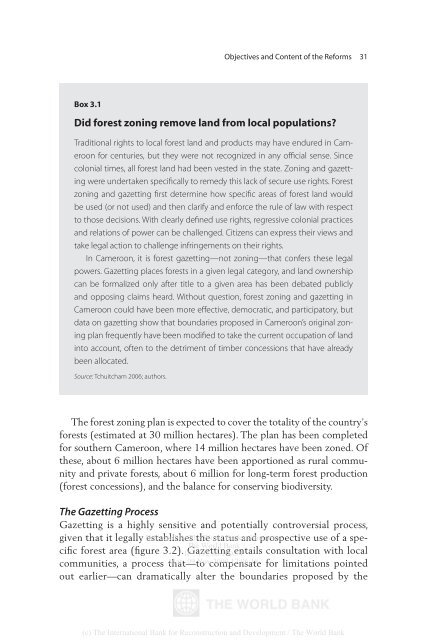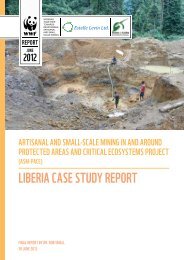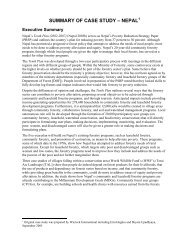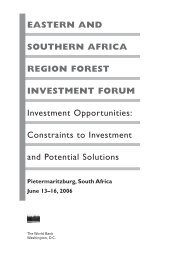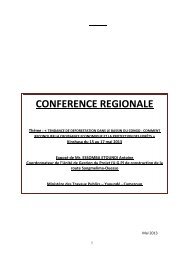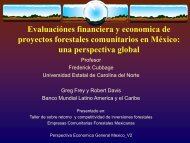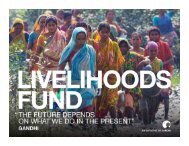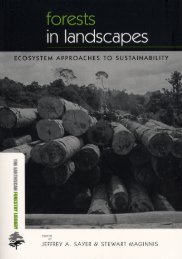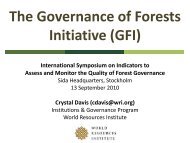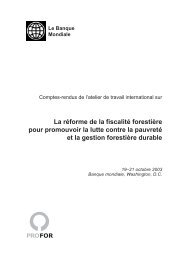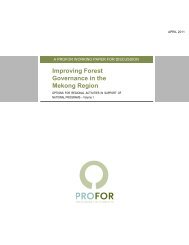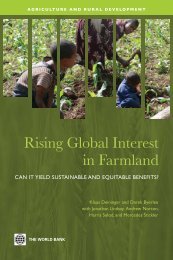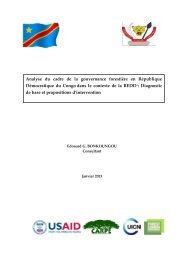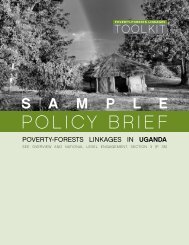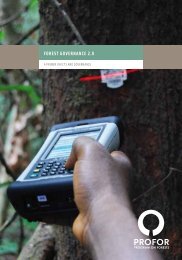The Rainforests of Cameroon - PROFOR
The Rainforests of Cameroon - PROFOR
The Rainforests of Cameroon - PROFOR
- No tags were found...
Create successful ePaper yourself
Turn your PDF publications into a flip-book with our unique Google optimized e-Paper software.
Objectives and Content <strong>of</strong> the Reforms 31Box 3.1Did forest zoning remove land from local populations?Traditional rights to local forest land and products may have endured in <strong>Cameroon</strong>for centuries, but they were not recognized in any <strong>of</strong>ficial sense. Sincecolonial times, all forest land had been vested in the state. Zoning and gazettingwere undertaken specifically to remedy this lack <strong>of</strong> secure use rights. Forestzoning and gazetting first determine how specific areas <strong>of</strong> forest land wouldbe used (or not used) and then clarify and enforce the rule <strong>of</strong> law with respectto those decisions. With clearly defined use rights, regressive colonial practicesand relations <strong>of</strong> power can be challenged. Citizens can express their views andtake legal action to challenge infringements on their rights.In <strong>Cameroon</strong>, it is forest gazetting—not zoning—that confers these legalpowers. Gazetting places forests in a given legal category, and land ownershipcan be formalized only after title to a given area has been debated publiclyand opposing claims heard. Without question, forest zoning and gazetting in<strong>Cameroon</strong> could have been more effective, democratic, and participatory, butdata on gazetting show that boundaries proposed in <strong>Cameroon</strong>’s original zoningplan frequently have been modified to take the current occupation <strong>of</strong> landinto account, <strong>of</strong>ten to the detriment <strong>of</strong> timber concessions that have alreadybeen allocated.Source: Tchuitcham 2006; authors.<strong>The</strong> forest zoning plan is expected to cover the totality <strong>of</strong> the country’sforests (estimated at 30 million hectares). <strong>The</strong> plan has been completedfor southern <strong>Cameroon</strong>, where 14 million hectares have been zoned. Ofthese, about 6 million hectares have been apportioned as rural communityand private forests, about 6 million for long-term forest production(forest concessions), and the balance for conserving biodiversity.<strong>The</strong> Gazetting ProcessGazetting is a highly sensitive and potentially controversial process,given that it legally Delivered establishes by <strong>The</strong> the World status Bank and e-library prospective to: use <strong>of</strong> a specificforest area (figure 3.2). IP Gazetting : 192.86.100.34 entails consultation with local<strong>The</strong> World Bankcommunities, a process that—to Mon, 09 Nov compensate 2009 17:06:18 for limitations pointedout earlier—can dramatically alter the boundaries proposed by the(c) <strong>The</strong> International Bank for Reconstruction and Development / <strong>The</strong> World Bank


